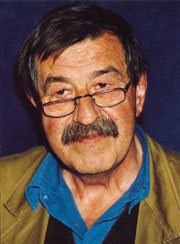The directory «Plots»
Grass Günter
(b. 1927),

German novelist, lyricist, artist, and playwright, b. Danzig (now Gdask, Poland). Writing from his experience in the Luftwaffe and as a prisoner of war, Grass deplores fascist militarism. The anguish of war and the social and political problems that West Germany faced before reunification are the principal concerns of his fiction.
His novel Die Blechtrommel (1959; tr. The Tin Drum, 1961), which brought him world renown, reveals his bizarre sense of humor and superb linguistic gifts. Related by Oskar Matzerath, a strange dwarf drummer, it aroused controversy in Germany with its idiosyncratic yet clear-eyed portrayal of recent German history from the prewar period, through the Nazi regime, to the Wirtschaftswunder of the postwar era. His second novel, Hundejahre (1963; tr. Dog Years, 1965), is a monumental work that also aroused considerable controversy. Set in Danzig, it deals, often grotesquely, with the Nazi years as it explores Germany’s destiny and conscience and the nature of individual flight from reality. Grass’s early poems and plays are marked by a sensitivity for imagery and a tendency toward symbolism and ambiguity (see Selected Poems, tr. 1966; Four Plays, tr. 1967; New Poems, tr. 1968).
His later works mainly reflect a period of intense political activism. Student unrest in Berlin and the political “generation gap” are the themes of his novel Örtlich betäubt (1969; tr. Local Anaesthetic, 1970) and a play adaptation, Davor (1970; tr. Max, 1972). Grass’s reflections on his life in Berlin and his political activities are the basis for the novel Aus dem Tagebuch einer Schnecke (1972; tr. From the Diary of a Snail, 1973). His highly acclaimed novel Der Butt (1977; tr. The Flounder, 1978), which contrasts the destructiveness of men with the sanity of women, examines such matters as politics, feminism, and the art of cooking.
Grass’s major 1990s work, the novel Ein Weites Feld (1995; tr. A Broad Field, 1995; tr. Too Far Afield, 2000) was widely criticized for rambling plotlessness. It also caused controversy because of its implied condemnation of Germany as an inherently dangerous nation forever inclined to authoritarianism, as well as for its suggested disapproval of reunification. Grass returned to nearly universal praise with Im Krebsgang (2002; tr. Crabwalk, 2002), his first 21st-century novel. Hauntingly descriptive, it centers on a real wartime occurence, the 1945 Soviet torpedoing of the German refugee ship Wilhelm Gustloff that killed more than 9,000. Mingling tragedy with irony, Grass uses this event, mixed with the fictional story of a single German family, to illuminate various phases in 20th-century German history, creating a story that moves, crablike, backward and forward through the detritus of crime and guilt in Germany’s recent past.
Grass’s other works include a collection of speeches and open letters entitled Speak Out! (tr. 1969) and the novels Mariazuehren (1973; tr. Inmarypraise, 1974) and Unkenrufe (1992; tr. The Call of the Toad, 1992). In 1999, Grass was awarded the Nobel Prize in Literature for his “frolicsome black fables [that] portray the forgotten face of history.”
Guinea, 2008, Frederic Mistral
Guinea, 2008, George Bernard Show
Guinea, 2008, Pearl Buck
Guinea, 2008, Samuel Beckett
Guinea, 2008, Albert Camus
Guinea, 2008, Gabriel Garcia Marquez
Zambia, 2001, Gunter Grass